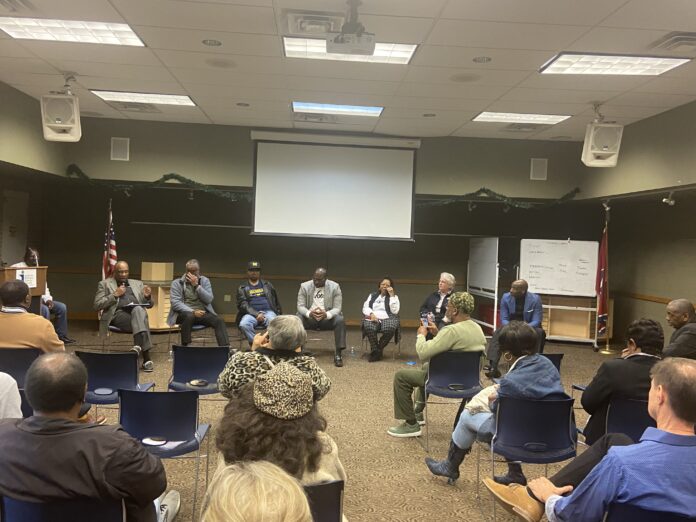By Brandon Shields
Managing editor
The New Jackson-Madison County Voters’ Council hosted a Black History Month event at Jackson-Madison County Public Library in Downtown Jackson on Feb. 24 that focused more on the present than history.
A panel of leaders in Jackson’s Black community were available for a discussion called “The State of Black Jacksonians.” The panel was made of NJMCVC President Willie Ozier, former school board members Doris Black and Morris Merriweather, Duane Cherry, City Clerk Daryl Hubbard, UT Martin criminal justice professor Cindy Boyles and William Watson, the senior pastor of Historic First Baptist Church.
The objective of the event was to have difficult conversations about the current state of Jackson’s Black community, its issues and solutions to the problems.
A number of elected officials from the Madison County Commission, Jackson City Council and Jackson-Madison County School Board were on hand for the discussion.
Among the topics of discussion were the local criminal justice system, the local education system, representation on local governmental bodies in Jackson and Madison County, getting Black voters to the polls and the churches’ role in getting Black voters to the polls.
Boyles mentioned how the United States is home to about 5 percent of the world’s population but has about 25 percent of the world’s incarcerated prisoners.
The panelists discussed how the criminal justice system appears to be geared toward keeping people in jail as long as possible with various fees and other court costs that can be used as tools to keep them in jail longer because they aren’t able to pay those costs if they’re stuck in prison.
Hubbard, who’s been the city court clerk for more than two decades, told one story of how it appeared he was almost targeted unnecessarily one night.
“I’d been at the T.R. White Sportsplex and was driving away on Royal Street when a Jackson Police officer pulled me over,” Hubbard said. “As the officer walked up, he said, ‘We pulled you over because we ran your plates and there are a number of warrants out on you.’
“And I responded with, ‘If there are warrants out on me, I would know because they’d be in my office.’ And the officer said, ‘Sorry Mr. Hubbard. I thought you were someone else’ and ran back to his car and drove off. They saw a Black man driving a car and thought they could just pull me over and say it was for ‘warrants.’ That’s just wrong.”
Boyles also noted that law enforcement officers from other states have admitted to her that they do patrol the Black neighborhoods of their cities more because they’re more likely to win any charges pressed on vehicle stops.
The panel discussed education and how they’re all opposed to the plan to bring vouchers and charter schools into Madison County because of how they will affect funding for Jackson-Madison County Schools. They also pledged support for the leadership of JMCSS, particularly Superintendent Marlon King and School Board Chairman James “Pete” Johnson.
When discussing representation on the local legislative bodies, Ozier noted the 2020 Census numbers that said 45.5 percent of Jackson is Black and 38 percent of Madison County.
“I feel the demographics of the legislative bodies should reflect the demographics of the people they represent,” Ozier said. “And we actually see that on the county commission with nine Black members out of 25, but look at the other two.
“Three African-Americans on the school board and two on the City Council. How can that be in the city when there’s 45 percent Black and 46 percent white. We’re just one percentage point off but only two on the Council.”
Boyles also brought to the discussion the review of the city’s redistricting in 2021 when the City had lines drawn for districting, and Harrell Carter with the NAACP asked for new lines to be drawn to allow for a better representation of the Black community on the council. Members of the redistricting committee who were volunteer citizens admitted in the process they approved the original district map because they thought that was their only choice and actually recommended changing the lines for better representation opportunity.
The Council approved the new lines.
But in last year’s municipal elections, Johnny Dodd and Richard Donnell were the only two Black members elected to the Council, and neither had opposition. One sitting member of the Council, Tara Skinner, lost her bid for re-election, and one other candidate, Byron Elam, lost his bid for election by 17 votes. In the other five Council seats, four were unopposed and District 1 pitted a pair of Caucasian candidates against each other.
The conversation then transitioned to getting more Black people to run for office and getting Black people out to vote for them at the local and state level.
At the end of the discussion, Johnson, who’s a leader for the NJMCVC, approached the podium with action steps that included encouraging people to get out and vote and become involved in the community so that those in power can have access to their perspective and views.
Brandon Shields, brandon@jacksonpost.news


